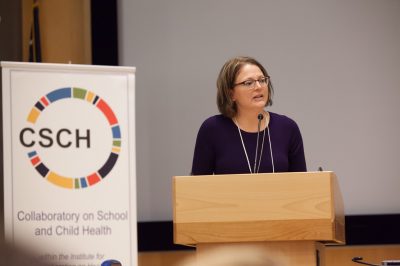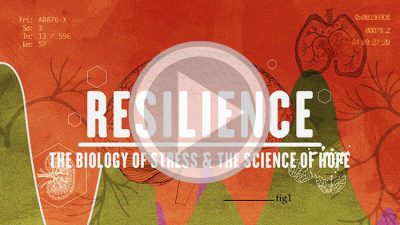Editor’s Note: The following piece originally appeared on the website for UConn’s Institute for Collaboration on Health, Intervention, and Policy (InCHIP).

A growing awareness of the prevalence of childhood exposure to trauma and an increased understanding of its corrosive, potentially lifelong impacts on health and behavior together are fueling a national movement to create trauma-informed schools, says InCHIP Principal Investigator (PI) Sandra Chafouleas. Such schools foster environments that are responsive to the needs of trauma-exposed students using systematic approaches and implementation of effective practices, the Board of Trustees Distinguished Professor of Educational Psychology explains.
Chafouleas co-authored an introduction to a special issue of the journal School Mental Health devoted to the topic and also wrote an article for the issue offering a blueprint for trauma-informed schools in spring of 2016. Since then, UConn’s Collaboratory on School and Child Health (CSCH), which Chafouleas co-directs, has been working to coalesce efforts to build a state model for trauma-informed schools in Connecticut. Steps taken include hosting a documentary screening and panel discussion, co-sponsoring a well-attended conference, helping to form a monthly working group comprised of relevant state and local stakeholders, and taking part in a series of professional development opportunities offered for educators across the state this fall.
“Once educators look at student behavior through a trauma-informed lens, it is easier to reframe their questions from blaming the child to asking what happened to the child and how can we help.”
— Sandra Chafouleas,
Board of Trustees Distinguished Professor
Its initiative in this area is an example of CSCH doing precisely what it was formed to do two years ago. CSCH, which represents a partnership between the University’s Neag School of Education, Office of Public Engagement and InCHIP, brings researchers, policy makers, and practitioners together to promote the health, safety, and well-being of the whole child.
“We don’t always ask the right questions when we see a student struggling academically, missing school, or getting into trouble repeatedly,” Chafouleas says. “Once educators look at student behavior through a trauma-informed lens, it is easier to reframe their questions from blaming the child to asking what happened to the child and how can we help.”
In reframing, schools then can respond by teaching students needed coping and self-regulation skills instead of possibly re-traumatizing students with harsh discipline policies that don’t address the underlying problems, she says.
In the special journal issue, Chafouleas highlighted the Substance Abuse and Mental Health Services Administration (SAMHSA)’s four key assumptions underlying trauma-informed approaches: (1) a realization of the widespread prevalence and impact of trauma, (2) a recognition of the signs of traumatic exposure, and (3) a response grounded in evidence-based practices that (4) resists re–traumatization of individuals.
The blueprint she wrote with colleagues shared some of the best evidence-based interventions that schools could adopt, described using a familiar framework for multi-tiered service delivery within schools – the School-wide Positive Behavior Interventions and Supports (SWPBIS) framework developed by her Neag School of Education colleague Professor George Sugai. That framework focuses on planning, implementation, and evaluation of services across different levels of student need.
Using a multi-tiered service delivery approach, a school system might adopt a curriculum for social-emotional learning to teach all students coping and resilience, provide a smaller portion of the student body exposed to traumatic events access to in-school counseling resources, and identify an even smaller group of students exhibiting negative effects of trauma exposure and assess whether they need a combination of in- and out-of-school services. For example, in New Haven, the Clifford Beers Clinic partnered with the New Haven Public Schools and other agencies to lead trauma-informed school services. Led by the Clifford Beers Clinic, all school personnel received what Chafouleas refers to as “Trauma 101” training, students with moderate need have been offered access to an evidence-based intervention delivered in schools, and care coordinators intervene with those students and families experiencing the most toxic effects of trauma.
“Schools form a great space for addressing childhood trauma and its lasting effects,” Chafouleas says. “The kids are already there. Prevalence research estimates that two out of three children will be exposed to trauma by the age of 17. We want to facilitate the early identification of children affected by trauma, and to create ease of access to the most appropriate services to facilitate child wellbeing.”
“There are a lot of people and groups around the state who are committed to this kind of work,” Chafouleas says. “The question at the outset was, how do we bring them together to do the work more efficiently and effectively?”
Last fall, CSCH hosted one of the first screenings of the documentary “Resilience: The Biology of Stress and the Science of Hope” followed by a panel discussion with the film’s director James Redford; Alice Forrester, Clifford Beers Clinic chief executive officer and CSCH steering committee member; and Paul Diego-Holzer, executive director from Achieve Hartford!. The documentary chronicles the work of the researchers who discovered the long-term biological, psychological, and social effects of abuse and neglect in childhood, and highlights the efforts of pediatricians, therapists, and educators using the best evidence-based interventions to help children exposed to chronic stress. New Haven Public Schools and Clifford Beers Clinic are among those featured in the film.

Then, in the spring, CSCH co-sponsored a symposium on trauma-informed schools attended by more than 100 education, mental health, and community leaders, including an introduction by Connecticut Department of Education (CT DOE) Commissioner Dianna Wentzell. The Neag School of Education, Capitol Region Education Council (CREC), CT DOE, Ana Grace Project, Clifford Beers Clinic, and the Child Health Development Institute (CHDI) collaborated with CSCH on the conference.
Throughout this fall, Connecticut Association of Schools (CAS) and Clifford Beers Clinic have sponsored five additional screenings of “Resilience,” coupled with panel discussions across the state, in response to educators’ overwhelming interest in learning about trauma-informed approaches. The professional development opportunities have been offered in Hampton, New London, Cheshire, Norwalk, and Torrington. Chafouleas and Forrester have each participated on many of the panels.
And a working group consisting of the symposium collaborators and additional organizations continues to meet monthly to discuss what a state model for trauma-informed schools should look like in Connecticut and to create an action plan for developing it. Chafouleas says the working group is using a multi-tiered service delivery framework such as the one presented in her blueprint as a guide, but each partner also brings its own experiences and expertise to the process.
Chafouleas says a number of CSCH’s partners have indicated they are pleased to have UConn at the table committed to working with them, from helping to identify the best-evidence based policies and practices to eventually guiding effective implementation of the model and evaluating how it is working.
Related Stories:
- VIDEO: Think About the Link Between Learning and Health: Schools as the Hub for Whole-Child Success
- State Leaders Attend Symposium on Childhood Trauma, Mental Health
- Sandra Chafouleas Named Board of Trustees Distinguished Professor
- Lessons From ‘Resilience’ on Achieving Whole-Child Focus in Educator Preparation
- New Collaboratory Focuses on Research to Improve School and Child Health
 Facebook
Facebook
 Twitter
Twitter
 LinkedIn
LinkedIn
